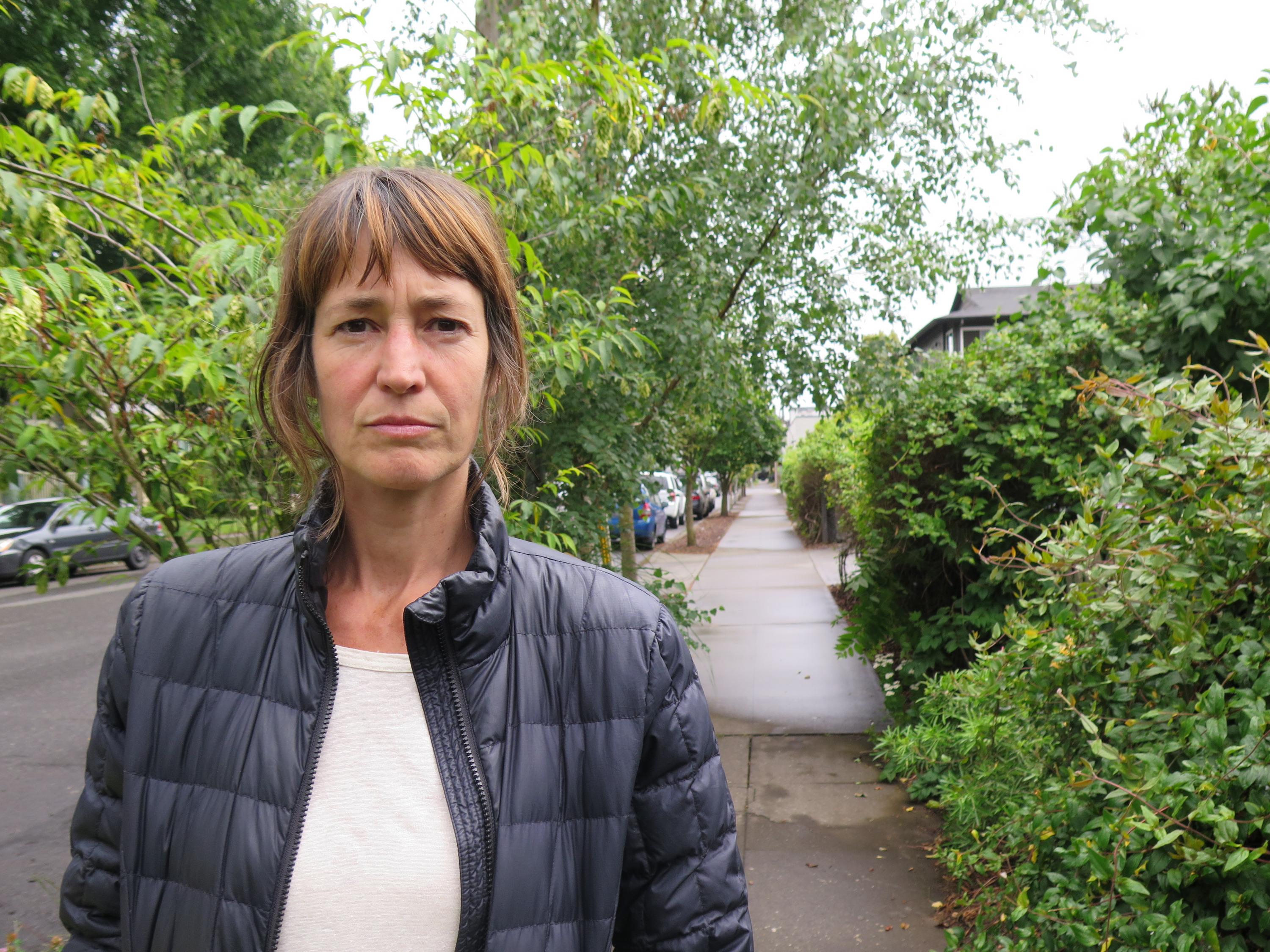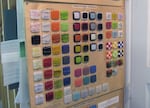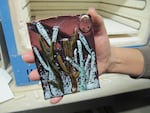
Southeast Portlander Jess Beebe says she wants regulators to adopt a precautionary principle. "We need to look to our health and set benchmarks really high. We can’t do what we’ve done in the past."
April Baer / OPB
Several Portland factories are in the public eye this month as Oregon regulators take public comment on new rules for making art glass.
Their process involves some heavy metals. Untill now, those emissions have gone mostly unfiltered.
While the state Department of Environmental Quality is working out a permanent system of rules, there's still a long list of people with unanswered questions about the art glass business and human health.
One of the names at the top of that list is Jess Beebe. She got some unwelcome news from the lab this spring.
"My arsenic levels were quite high," Beebe says. "And lead levels." Beebe is an artist and designer with her own clothing line and has used paints in her practice. "But," she adds, with a wary smile, "I'm not eating them."
Beebe lives with her husband and young daughter just blocks from Bullseye Glass. They've been there 12 years. As an artist, Beebe says she's anything but insensitive to the concerns of a local art business she considered a neighbor for years.
"I was always happy about it," she says. "I watched then expand and build these beautiful buildings, and we'd always see blocks of glass stacked up. But I didn't really know much about their business."
Related: Bullseye Glass Is Back In Business With New Limits
When a forest service study revealed toxic metals in moss growing near Bullseye in February, Beebe decided to undergo expensive blood tests. She’s in the 90th percentile for arsenic exposure.
Her lead levels are higher than average, and right on the borderline for where health officials would ask patients to figure out how to reduce their exposure. She's been seeing a naturopath.
"They recommended chelation," says Beebe, referring to a process by which doctors inject a synthetic solution to remove metals from the blood.
"That's scary. It's very serious. It's something that should be done with the doctor."
She ultimately decided not to do chelation which carries its own side effects. She's going to try to work on her health in other ways, and re-test this fall.
Just to be clear, there are discrepancies in how naturopaths and traditional doctors see the metals risk in Southeast Portland. The Multnomah County Health Department has given the OK for people to send their kids out to play, and eat vegetables grown in back yards near Bullseye. The Oregon Health Authority is not recommending people get tested out of hand, but suggests a chat with the doctor to help decide.

Bullseye's wide range of compatible colors for fused glass projects have made the company a desirable supplier for schools like Aquila.
April Baer / OPB
What's haunting the glassmakers' neighbors, like Beebe, is the thought of how layers of exposure have affected them over the years.
"What really concerns me," Beebe says, "is single moms out there, or people who don't have money, they don't have good insurance. None of this was covered on my insurance. There's probably so many people out there who haven't been tested."
Both Bullseye and rival maker Uroboros are producing limited product lines right now. Both have suspended unfiltered use of many metals.
But officials are still short on answers about chromium levels have still tested high in Southeast Portland.
Bullseye is not using chrome right now. But test results in April showed higher-than-average levels near the plant. Since then, DEQ officials say daily averages have dropped somewhat, but they are still reviewing source test data, including Bullseye and a cement plant in the neighborhood. They'll have more to say about chrome levels later this week.
Later this month, DEQ will hold a meeting to take public comment on permanent rules for the art glass industry. One of the key questions is whether rules should apply to makers who produces less than ten tons of glass per year, and whether the rules should apply statewide.
The art glass industry's problems are not limited to regulation or potential health risks.

A sample of student work from Aquila.
April Baer / OPB
Aquila Art Glass is a teaching studio on Portland’s north end.
Aquila co-founder Don Bietschek says a lot has changed since February.
"We're struggling," Bietschek says. "Since February our sales have continued to go down as more and more of this stuff comes out. People don't want to be involved in the emotionalism, the political stuff. So we just haven't had as many people coming in," Bietschek said.
His side business of making cabinet knobs and other small hardware is still going, but supply of materials is becoming a problem, too.
Aquila has resorted to a GoFundMe campaign to try to raise $16,000. Bietschek says that's what it's going to cost to stay open until September.
He says he hopes Bullseye will be back to full production, with filters fully installed, by that point.

